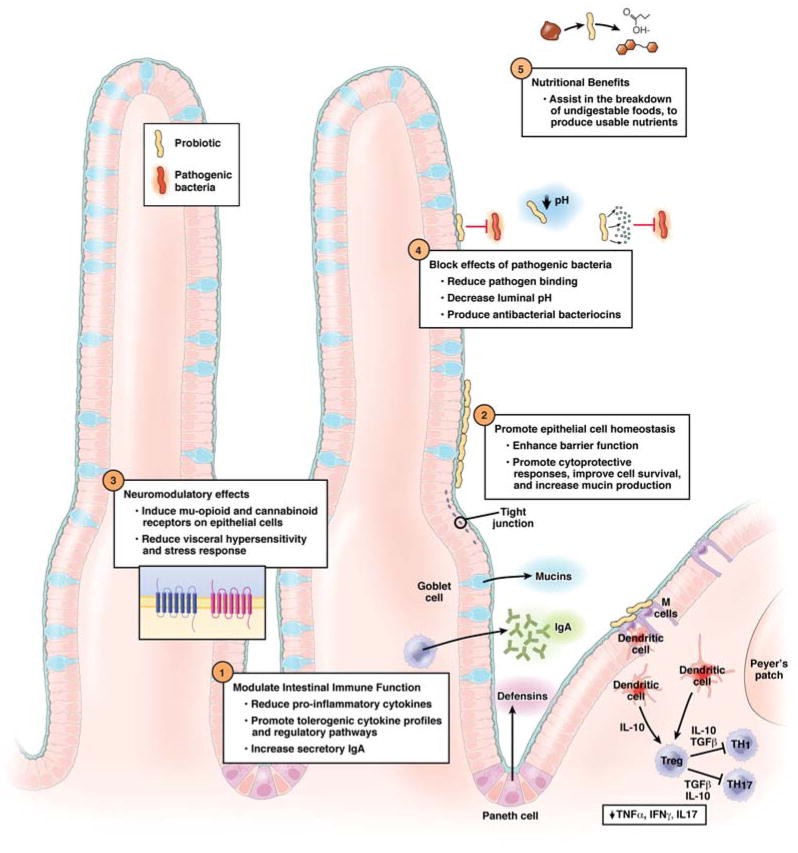Probiotics have gained significant attention for their potential to improve gastrointestinal health. With so many options available, understanding which probiotic is best can be confusing. This guide provides a comprehensive overview of probiotics, their mechanisms, and the evidence supporting their use for various conditions.
Understanding Probiotics and the Gut Microbiome
The human gastrointestinal tract is home to trillions of microorganisms, collectively known as the gut microbiome. This diverse community of bacteria, viruses, and fungi plays a crucial role in digestion, nutrient absorption, immune function, and overall health. When the balance of the gut microbiome is disrupted, it can lead to various health issues.
Probiotics are live microorganisms that, when administered in adequate amounts, confer a health benefit on the host. They work by modulating the gut microbiome, enhancing the mucosal barrier, and exerting anti-pathogen effects.
 Mechanisms of action for probiotics in the gastrointestinal tract
Mechanisms of action for probiotics in the gastrointestinal tract
Key Considerations When Choosing a Probiotic
Not all probiotics are created equal. The effectiveness of a probiotic depends on several factors, including:
- Strain Specificity: Different probiotic strains have different effects. The best probiotic for you will depend on your specific health needs.
- Dosage: Probiotics need to be administered in adequate amounts to exert their beneficial effects.
- Quality and Viability: Look for reputable brands that ensure product quality, purity, and viability.
Probiotics for Specific Conditions
1. Antibiotic-Associated Diarrhea (AAD)
Antibiotics can disrupt the gut microbiome, leading to diarrhea. Certain probiotic strains, such as Lactobacillus rhamnosus GG (LGG) and Saccharomyces boulardii, have been shown to be effective in preventing AAD.
2. Clostridium difficile-Associated Diarrhea (CDAD)
C. difficile is a bacterium that can cause severe diarrhea and colitis, often following antibiotic use. While more research is needed, some studies suggest that certain probiotics may help prevent CDAD.
3. Irritable Bowel Syndrome (IBS)
IBS is a common disorder characterized by abdominal pain, bloating, and altered bowel habits. Some studies have shown that certain Bifidobacterium strains, such as Bifidobacterium infantis 35624, can help alleviate IBS symptoms.
4. Inflammatory Bowel Diseases (IBD)
IBD, including Crohn’s disease and ulcerative colitis, involves chronic inflammation of the gastrointestinal tract. While probiotics may not be a primary treatment, some studies suggest that certain strains, such as E. coli Nissle 1917 and VSL#3, may help induce and maintain remission in ulcerative colitis.
5. Acute Infectious Diarrhea
For acute infectious diarrhea, particularly in children, Lactobacillus rhamnosus GG (LGG) and L. reuteri have shown promise in reducing the severity and duration of diarrhea.
Probiotic Products and Guidelines
| Brand Name (Company) | Bacterial Species | Clinical Condition | Effectiveness | Practice Guidelines | Bacteria Count/Dosing |
|---|---|---|---|---|---|
| Align (Proctor & Gamble, Cincinnati, OH) | Bifidobacterium infantis 35624 | IBS | B | 1b | 1 billion/1 QD |
| Culturelle (Valio/Amerifit Brands, Inc.) | L. rhamnosus GG (LGG) | AAD Prevention | A | AAP, 1b | 10 billion/1 QD |
| Florastor (Biocodex, Inc.) | Saccharomyces Boulardii | AAD Prevention | A | AAP, 1a, 1b | 250 mg/1 BID |
| Mutaflor (Ardeypharm, Herdecke, Germany) | E.coli Nissle 1917 (ECN) | UC Induction | B | 100 mg/capsule/BID | |
| VSL#3 (Sigma-Tau Pharmaceuticals, Inc.) | Combination (Streptococcus thermophilus, Bifidobacterium, Lactobacillus) | IBS, UC Induction, Pouchitis | B/C, B, A | 1b | 122.5 billion/capsule, 450 billion/sachet |
It’s essential to consult with a healthcare professional to determine the best probiotic for your specific needs.
Considerations for Probiotic Use
- Side Effects: Probiotics are generally safe, but some people may experience gas and bloating, especially when starting.
- Timing: The long one has to take a probiotic depends on the desired effect. Sustained benefit from a probiotic likely requires continued consumption.
- Contraindications: Probiotics should be avoided in critically ill patients and those with severe immune compromise.
The Future of Probiotics
Research into the human microbiome and probiotics is rapidly evolving. Future applications of probiotics may include conditions such as mood disorders, obesity, autism, and diabetes.
Conclusion
Choosing the best probiotic requires careful consideration of strain specificity, dosage, quality, and individual health needs. While probiotics offer potential benefits for various gastrointestinal conditions, they should be used as a supplement to, rather than a replacement for, conventional therapy. Consult with a healthcare professional to determine the most appropriate probiotic for your specific situation.